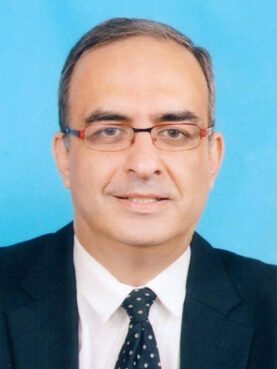SEOUL, South Korea (RNS) — At the 14th General Assembly of the World Evangelical Alliance, held here the last week of October, the Rev. Jack Sara pondered what he called a generational and geographical shift in the global evangelical Christian landscape.
“It is very clear that the WEA is witnessing change because, firstly, the European and North American leadership is gradually being replaced by Eastern, African and Asian leaders,” said Sara, who is president of Bethlehem Bible College and general secretary of the alliance’s Middle East and North Africa region.
Sara pointed to the appointment in August of the Rev. Botrus Mansour, a resident of Nazareth, in Israel, as the WEA’s new secretary general, who oversaw his first WEA conference in his new role. The appointment is a milestone for Palestinian Christians, Sara said, but also puts a new focus on Christian communities in places affected by occupation, poverty or political instability.
Sara, 51, said the emerging leaders from these places “have more grounding in the challenges that exist in society … not material sources, but more theological experiences, spiritual experiences, experiences in the church,” he said. “The church is difficult to find in some places in our region, yet it is on the rise everywhere, even amid the complexities of today’s world.”
He also pointed to the growth in the number of the evangelicals among Christians in the Middle East. Egypt and Lebanon have vibrant evangelical communities despite pressure their governments have put on Christians. Sara cited a WEA report showing that evangelicals in Egypt now number close to 1.5 million, comprising about 10% of the 15 million Christians living in Egypt today. “The church is much larger today than ever before,” said Sara. “We’re talking about evangelicals, today are the most active and numerical Christian denomination, and they are extending a helping hand to communities around the world.”

Meanwhile, the church is growing spiritually and intellectually as well, which Sara attributed to theological education. “I see the healing power of theological education in our entire region. It’s not just about teaching the Bible, but other sciences at the university level, the doctoral level, even beyond the level of a doctor,” he said. This focus on education, he explained, “fosters both spiritual and community development.”
Despite these advances, Sara acknowledged the challenges facing evangelicals, particularly in the Arab world. Migration and political instability have fragmented Christian communities in the Palestinian territories, Iraq, Syria, Lebanon and Jordan. “Migration has created a rift in the Christian presence in the Arab world,” he said.
Externally, evangelicals often confront societal pressures and their minority status. Internally, said Sara, communities sometimes “withdraw into ourselves because we are fewer in number, because we must preserve our Christian identity.” He stressed that true faith fosters bridge-building, love and dialogue rather than division and exclusion.
Sara said Mideast evangelicals are conscious of the complex interplay between Western influence and local autonomy. “One of the problems is a chain of dependence — material dependence, authoritarian dependence and intellectual dependence on the West. It’s as if the West is still capable of transmitting the doctrine. Some argue that if we abandon the West, we may lose an important source,” he said. He added that while Western support is valuable, local leaders must also be empowered and put extra effort into developing their communities independently.

Sara called for Christian denominations in the Middle East to collaborate and seek unity. “The challenge is the need to build bridges. There aren’t enough bridges between us and (other) Christian denominations. We are isolated, but we extend our hands to people even if they differ from us in faith and beliefs, even in the doctrine of Christ,” he said. He argued that fostering these connections is essential for strengthening Christian communities in the Middle East and beyond.
The appointment of Mansour, according to Sara, shows the WEA’s commitment to embracing diversity in leadership and responding to the realities of a global church. By empowering leaders like Mansour, the WEA acknowledges the changing demographics, challenges and opportunities facing Christians worldwide.
Sara’s own MENA region remains a critical hub for leadership and theological development, as Mansour’s appointment indicates. The region continues to nurture faith and produce leaders capable of engaging both local and global communities. In celebrating Mansour’s appointment, Sara and the MENA evangelical community signal hope for a more inclusive, connected and spiritually robust global church — one that honors its diverse constituencies while remaining grounded in faith, service and theological integrity.
(Daoud Kuttab is the publisher of Milhilard.org, a Christian news site dedicated to communities in Jordan and Palestine, and the author of “State of Palestine NOW.” Follow him on X @daoudkuttab. The views expressed in this commentary do not necessarily reflect those of Religion News Service.)
Original Source: